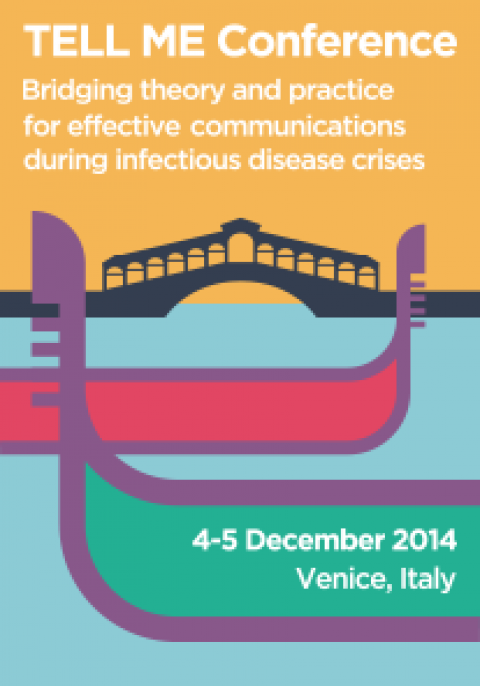TELL ME conference. Between theory and practice

A proper health communication is crucial, especially when facing a major emergency like an infectious disease outbreaks. Improving communication effectiveness is a big challenge for those working in public healthcare and was also one of the main topics discussed during the TELL ME Conference, Bridging Theory And Practice For Effective Communications During Infectious Disease Crises, which was held in Venice, on December 4th and 5th. TELL ME is an EU-funded project that aims to provide evidence and to develop models for improved risk communication during infectious disease crises.
TELL ME comprises members from different sectors and expertise – public health, social sciences, behavioural sciences, political sciences, law, ethics, communication and media – from prestigious institutions in eight countries. After three years of work, they will gather in Venice to present new communication tools and strategies, aimed to better involve the public and healthcare providers in the communication process, and to ensure that messages reach their target during all phases of the epidemic or pandemic.
During the conference, Anat Gesser-Edelsburg, from the School of Public Health of the University of Haifa, presented a new participative model for risk communication, which would help public health authorities to secure optimal preparedness for infectious disease threats by increasing the resilience of all communities during epidemics and pandemics.
Jennifer Badham, from the University of Surrey, showed an agent-based simulation model specifically developed for public health officials and decision makers, to simulate the possible spread of a disease depending on the different approaches to communication applied, the progress of an epidemic and the protective behaviours adopted by individuals.
Another relevant product of TELL ME project was introduced by Roberta Villa, from the agency of scientific journalism Zadig: two e-learning courses for primary healthcare workers, one that provides general medical guidelines about infectious diseases like flu or SARS, together with information and advices on how to properly communicate with patients and citizens, and the other one specifically dedicated to Ebola.
The conference saw the participation of representatives of the World Health Organisation (WHO), the European Centre for Disease Prevention and Control (ECDC) and the US Centres for Disease Control and Prevention (CDC), who shared their experience in the field of disease management and risk communication. Health policy makers, communications officials and representatives from public health authorities that operate at an international, European, national and local level, healthcare providers, civil servants, the pharmaceutical industry, NGOs and the media were also involved. Such an audience represented an ideal target for the conference’s messages and constituted a wishful beginning for the creation of a community where knowledge from similar initiatives can be shared and unique viewpoints can be expressed.
In particular, the results and the experience that have been shared in Venice will constitute an ideal ground for ASSET project to grow on. By taking over from TELL ME, ASSET will thus be able to effectively address scientific and societal challenges raised by pandemics and associated crisis management, and define and test a participatory and inclusive strategy to succeed.
